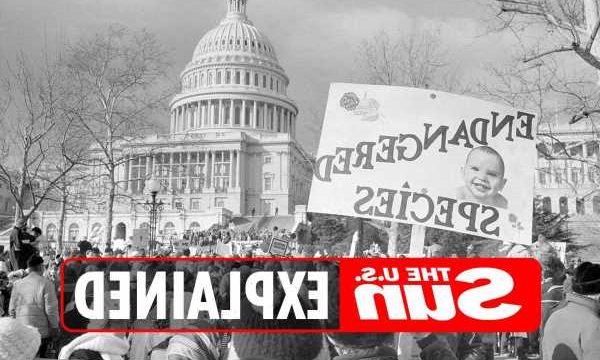IN the early 1970s, the Supreme Court took up a landmark case titled Roe v. Wade to determine the future of abortion rights across the United States.
The ruling has been threatened by near-total bans on abortion that have been passed in Alabama, Missouri and Mississippi.
What is Roe v Wade?
The 1973 ruling of Roe v. Wade asserted the 14th amendment and declared access to safe and legal abortion as a constitutional right.
The case was heard to decide if Texas' ban on abortions, which were completely outlawed except when a woman's life was in danger, was constitutional.
The Supreme Court voted 7-2 in favor of the right to an abortion.
It said women had a right to privacy, which meant it was up to them to decide whether to continue their pregnancy.
It also divided pregnancy into three trimesters, declaring that the first three months are solely at the discretion of the woman.
In the second trimester, the states can regulate abortions in the interests of the woman's health.
In the last three months, states can prohibit abortions in the interest of the fetus, provided the pregnancy will not bring harm to the pregnant woman.
Who was behind Roe v. Wade?
Justice Blackmun wrote the majority opinion in the case after the decision had been made.
He said: "We forthwith acknowledge our awareness of the sensitive and emotional nature of the abortion controversy, of the vigorous opposing views, even among physicians, and of the deep and seemingly absolute convictions that the subject inspires."
Also voting in support of Roe was Justices Burger, Douglas, Brennan, Stewart, Marshall and Powell.
What did Roe v. Wade accomplish?
After the decision 46 states needed to change their abortion laws to comply with the ruling.
Abortion has proved to be one of the most divisive moral issues in recent years, with 'pro-life' groups comparing the procedure to murder.
On the flip side, 'pro-choice' groups argue that abortion should be safe and legal for anyone who needs one.
The number of abortions performed each year has been falling.
For women ages 15 to 44, the abortion rate (the number of abortions per 1,000 women) dropped 26 percent between 2006 and 2015, according to the Centers for Disease Control and Prevention.
In 2006, US medical professionals reported performing 842,855 abortions but by 2015, that number dropped to 638,169.
Does Roe v. Wade still stand?
There have been many challenges to Roe v. Wade since it was established.
In 2007, the Supreme Court upheld a federal ban on late-term abortions, so-called partial-birth abortions.
This was the first time since Roe that the Court had upheld an abortion ban.
In 2016, it ruled that Texas cannot place restrictions that create an undue burden for women seeking an abortion.
What law did Texas pass about abortions in 2021?
Texas passed a law banning abortion from as early as six weeks in September 2021.
It bans abortions after the detection of the "fetal heartbeat," which some medical authorities have deemed misleading.
The law took effect after the Supreme Court did not respond to an emergency appeal by abortion providers.
It gives any individual the right to sue doctors who perform an abortion past the six-week point.
The law, known as the Heartbeat Act, was signed into effect by Texas governor Greg Abott in May 2021.
Planned Parenthood and the American Civil Liberties Union (ACLU), then requested that the Supreme Court block the legislation.
On September 1, the ACLU confirmed that the court had "not responded to our request", adding: "Access to almost all abortion has just been cut off for millions of people."
The group have described the law as "blatantly unconstitutional."
Texan women who wish to have an abortion after six weeks will need to travel across state lines to find a physician or clinic that can perform the procedure.
Americans may be able to seek up to $10,000 in damages in a civil court against abortion providers as well as anyone who "aides and abets" an illegal abortion.
In theory, this could mean clinic staff and family members could all be targeted for a law suit.
The ACLU have said that the law will encourage "a bounty hunting scheme" of costly "vigilante lawsuits" designed to harass women seeking an abortion.
Source: Read Full Article


